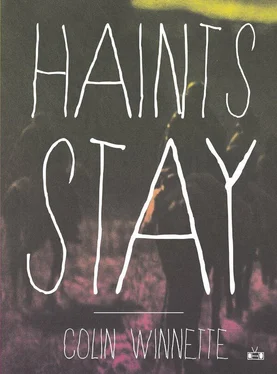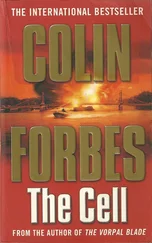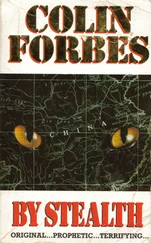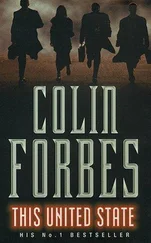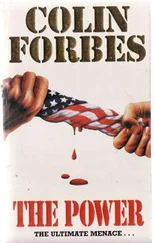“You have not finished even one hole,” said Bird.
She’d seen him coming, but had not lifted herself from the dirt to take up the shovel.
“It is hard to dig a hole the size of a body, and you want me to dig twelve.”
“Fifteen,” said Bird.
“But I don’t even want to dig twelve.”
“You’ve got to, Mary.”
“I need help.”
“But you won’t help me move them.”
“So dig with me then move them and I will go to bed. I can’t stand today and I can’t stand what you have done.”
“What have I done?”
“You have made this place horrible and made me feel frightened and taken away my sense of security in our building with the kitchen while we wait for Martha.”
“Martha is not coming back.”
“Yes, she is.”
“That man killed everyone, Mary.”
“So?”
“Not one of them survived.”
“Stop it, Bird. We survived.”
“Because we were hidden,” he said.
“I’ve been looking,” he said, “and I’ve found no one.”
“I cannot dig fifteen holes,” said Mary.
“Then I will dig them,” said Bird.
He took the shovel from where she’d set it and he bent toward the small hole she’d started. She drank more of the wine. He plunged the shovel into the dirt and leveraged it against a bent leg to extract the shovel-full. Again and again, slowly, he unearthed handfuls of dirt. A considerable amount was lost back into the hole, but he kept at it and it began to make a distinguishable difference.
After an hour or so, he had nearly completed a hole long enough to set a body in, but far too shallow for it to stay set. Mary was still to the side of the grave. The chicken and bread were gone. The wine too. She was alternating between sitting and watching and resting on her back to stare at the clouds moving past.
“You could get a second shovel,” said Bird.
She lifted her palms and showed him that they were spotted with blisters.
He lifted his palm and showed her the same.
“We cannot dig fifteen holes,” she said.
He nodded. He was sweating and sore and there were still more houses to check, more horrors to discover.
“We could dig one big hole,” he said. “We could put them all together.”
Mary liked it. Both as an idea, the whole town together like that, and because it meant the level of the digging left to do was greatly reduced.
Bird found her a second shovel and they set to widening the hole. She wrapped her hands in the hem of her dress. Bird removed his shirt and wrapped his wounded palm in it. It was already bleeding slightly, and it stained the shirt as he worked. He seemed less and less present to Mary. More and more focused elsewhere.
“Do you know any digging songs?” she said.
He shook his head.
“I know a working song,” she said, “but not a digging song.”
He nodded, plunged his shovel into the dirt and pressed it with his foot. Things were coming up more easily now. The air was cooling off too, which made it only slightly more pleasant to work.
She sang her working song and a few minutes passed more easily. The song was about farming, but there was a little bit in there about the earth and working the dirt and the sun bearing down on you.
Later in the afternoon, the clouds moved in from over the mountains. A light snow began to fall, but it melted as it pressed into the ground. They would dig and dig, then take a break. Bird fetched water from the well and wine from the kitchen, at Mary’s request. He set the bottle in the water in its bucket, and carried a loaf of bread in his armpit. The snow kept falling. A thin blanket covered the bodies of the townspeople. Bird felt better already, to see them covered so peacefully. He recommitted to their plan, which was beginning to feel less and less possible.
He gave Mary the wine and bread and re-wrapped the shirt around the palm of his hand. Mary sat down to enjoy all he’d gathered and he set back to work.
“We are doing the right thing,” he said.
“Do you think they will come back to haunt us?” said Mary.
“Maybe if we had left them in their houses like they were,” said Bird.
“Maybe,” she said.
“Do you believe in ghosts?” she said.
“Yes,” said Bird.
“Why?”
“Because it is better to believe in them and never see one than not to believe in them when one decides to set upon you.”
“You are forever concerned with protection,” said Mary. She began to laugh. She was brutally exhausted and giggling.
“It’s my hope to be prepared for whatever it is that comes at me next.”
“Do you think your arm will come to you as a ghost?” said Mary. “Do you think one morning you will wake and find it there, settled into place as it once was, only blue or white and sort of drifting between this world and the next?” She laughed again. She drank and ate.
“I do not think that,” said Bird. He plunged the shovel and leveraged it against his leg again. His strength was not fully in the gesture though, and the dirt rose up but fell back into the hole, rather than to its side. “You could help. You could add depth to the hole as I draw out its side.”
“It is important to break and restore your strength. You are going at this like a mad man with only a day to get it done.”
“I’d like to get it done.”
“We have time.”
“You’d like to sleep with those people in the street like that?”
“It’s snowing,” she said.
“Only slightly,” he said.
“Still, they will be covered.”
“But what about the ghosts,” he said.
“There is no such thing,” she said.
Bird removed a knife from his belt and considered it.
“Do you have a knife?” he said.
She did not.
“But you can get one?”
She could.
“We’ll take their teeth,” he said.
“I don’t know what you mean.”
“We’ll bury their teeth. Bury their ghosts.”
“That is horrid and I’ve never heard of such a thing.”
“Will you help or not?”
“I will not,” she said.
As the sun began to set and the evening grew cool, they retreated to their building with the kitchen. The bodies lined up in the street were nothing more than row after row of raised snow, like a plowed field in winter. The blood was only faintly visible beneath the thinner layers, and it was vanishing with each passing moment.
Neither of them was in any condition to cook a meal, so they ate what was left of the bread with salt and stoked the fire and huddled together. Bird’s hand was well-worn and bloody. Mary’s hands were blistered and ready to pop. She rinsed the wounds with cool water, and bandaged each. It snowed steadily on outside. For the first time since they’d left home, they slept soundly through the night.
They woke to find the village covered in several feet of snow, with more of it still in the air. The rows Bird had set out were unidentifiable. The hole, on which they had worked so tirelessly, was filled now with snow and marked only by the snow-capped mound of dirt at its side.
The snow stayed with them for days. They dug out the store of logs lining the back of the building with the kitchen, and stacked them inside to thaw and dry. Most would not burn at first, but those that did warmed and worked to dry the others. They made more bread. Bird practiced with the pistol, although Mary insisted he do so upstairs. The sound of it startled her, but no matter of fussing or demanding would stop him.
He was closing off to her. He seemed distracted and uncomfortable. He would end what might have become a perfectly good conversation by refusing to answer with more than a single word.
“Do you think we might develop some land, when the snow stops?”
Читать дальше
